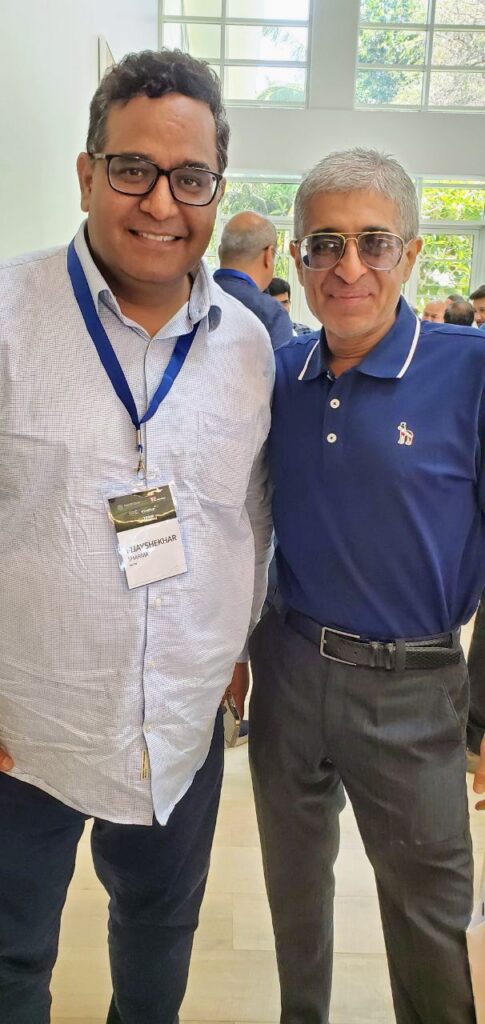INDIA’S BEST PRACTICES FOR CORPORATE GOVERNANCE
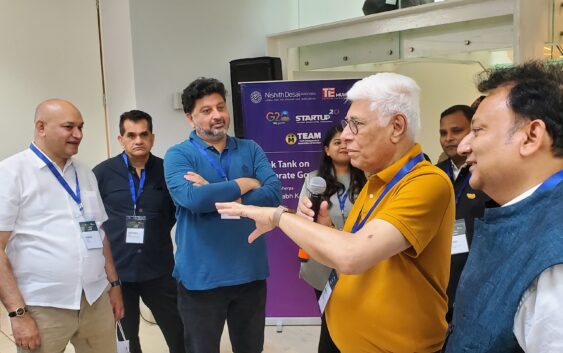

In April 2023, TiE Mumbai, in collaboration with Nishith Desai Associates and the Indian presidency of the G-20 2023, organized an exclusive think tank event at Imaginarium Aligunjan in Alibaug. This private enclave, which was also supported by Startup20, brought together over 30 leading unicorns and top venture capital funds.
The event was conducted under the guidance of Amitabh Kant, the Government of India’s G-20 Sherpa, and international lawyer Nishith Desai, Founder of Nishith Desai Associates and Board Member of TiE Mumbai. The conference aimed to improve India’s corporate governance brand, create new benchmarks for G20 nations, and address the critical imperative of corporate governance for Indian unicorns and startups as they expand their presence on the global stage.
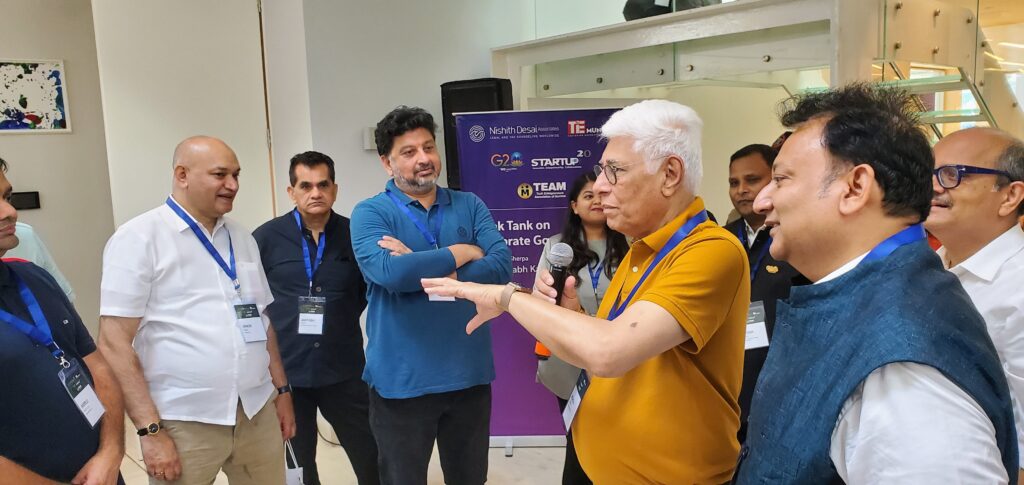
Nishith Desai, Founder of Nishith Desai Associates and Board Member of TiE Mumbai, said: “Good Governance is a critical issue for Startups. This think tank will have Unicorns, soonicorns, investors, and experts deliberating upon benchmarks and standards that Indian Startups should set and adhere to in order to succeed. Good Governance leads to trust, which is the hallmark of any good business. Indian startups and new-age Tech businesses are globally renowned for their products and services; hence it is imperative that we position ourselves as a stickler for High Standards of Corporate Governance as we strive to build a global brand.”

Nishith Desai, Founder of Nishith Desai Associates and a TiE Mumbai Board Member, has been a prominent advocate for the importance of good governance in startups. His views, as expressed during the TiE Mumbai think tank event and through his firm’s publications, emphasize the role of governance as a foundational element for building trust, achieving global success, and fostering sustainable growth in the startup ecosystem. Below is an elaboration of his perspectives based on available sources:
Key Insights from Nishith Desai on Startup Governance
1. Governance as a Trust-Building Mechanism:
-Desai highlights that good governance is critical for startups to build trust with investors, stakeholders, and customers. He asserts that trust is the hallmark of any successful business, and robust governance practices are essential to establish this trust.
-He believes that Indian startups, known globally for their innovative products and services, must position themselves as adherents to high standards of corporate governance to create a credible global brand.
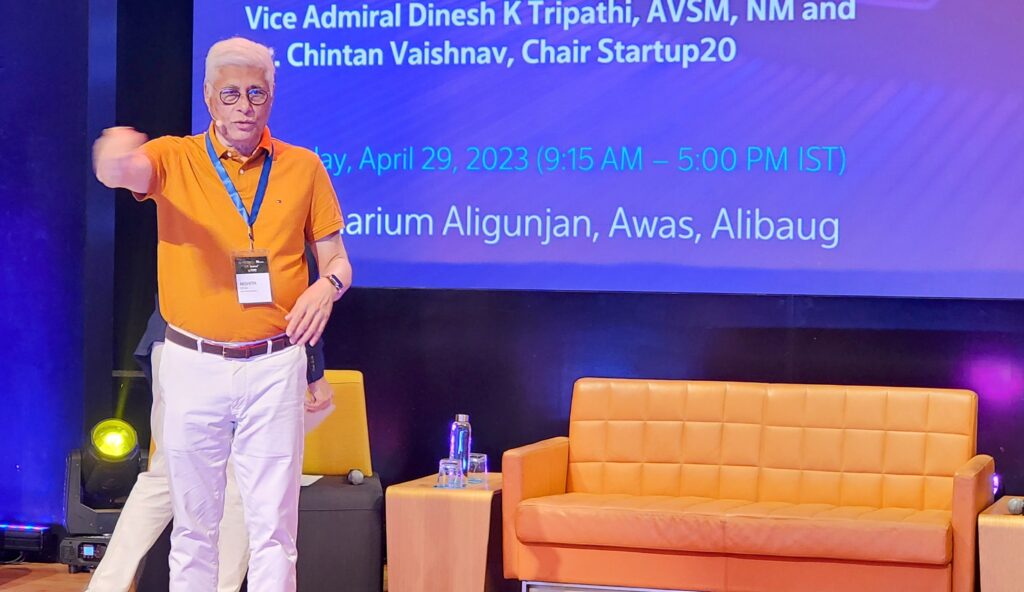
2. Governance Beyond Compliance:
– Governance is not merely about adhering to rules and regulations but is a strategic framework that guides decision-making, fosters transparency, and ensures sustainability.
– Desai emphasizes that governance should be embedded into the DNA of startups from their inception rather than being treated as an afterthought.
3. Role of Founders and Boards:
– In his publication *”Start-up Governance Essentials”*, Desai outlines the roles and responsibilities of founders and boards in establishing a culture of accountability and transparency. He stresses the need for founders to lead by example in promoting ethical practices and self-regulation.
– Structuring effective boards with independent directors is also highlighted as a best practice to ensure diverse perspectives and reduce conflicts of interest.
4. Balancing Growth with Responsibility:
– Desai acknowledges the unique challenges startups face in balancing rapid growth with responsible governance. He advocates for frameworks that enable startups to scale sustainably while managing risks related to finances, compliance, and operations.
– His recommended governance frameworks include provisions for crisis management, contingency planning, and aligning stakeholder interests.

5. Global Benchmarking and ESG Integration:
– Desai encourages Indian startups to adopt global best practices in governance, including environmental, social, and governance (ESG) principles. He believes that integrating ESG considerations into business strategies can enhance long-term value creation and attract global investors.
6. Startup Governance Framework:
– At the TiE Mumbai event, Desai contributed to discussions that led to the formation of an independent Startup Corporate Governance Committee under the Startup20 Engagement Group. This committee developed a recommended governance framework tailored for startups at different stages of maturity.
– The framework emphasizes transparency, accountability, ethical behavior, risk management, and compliance while being scalable to accommodate diverse industries.
7. Future-Focused Governance:
– In his writings, Desai envisions governance as a dynamic tool that evolves with the startup’s growth journey—from inception to maturity. He underscores its importance in preparing startups for IPOs or exit strategies while ensuring resilience against market uncertainties.
Broader Vision
Nishith Desai’s overarching vision is to position Indian startups as global leaders in innovation and governance by fostering a culture of responsibility and ethical business practices. His contributions aim to create a self-regulating startup ecosystem that aligns with India’s aspirations of becoming a trillion-dollar digital economy.
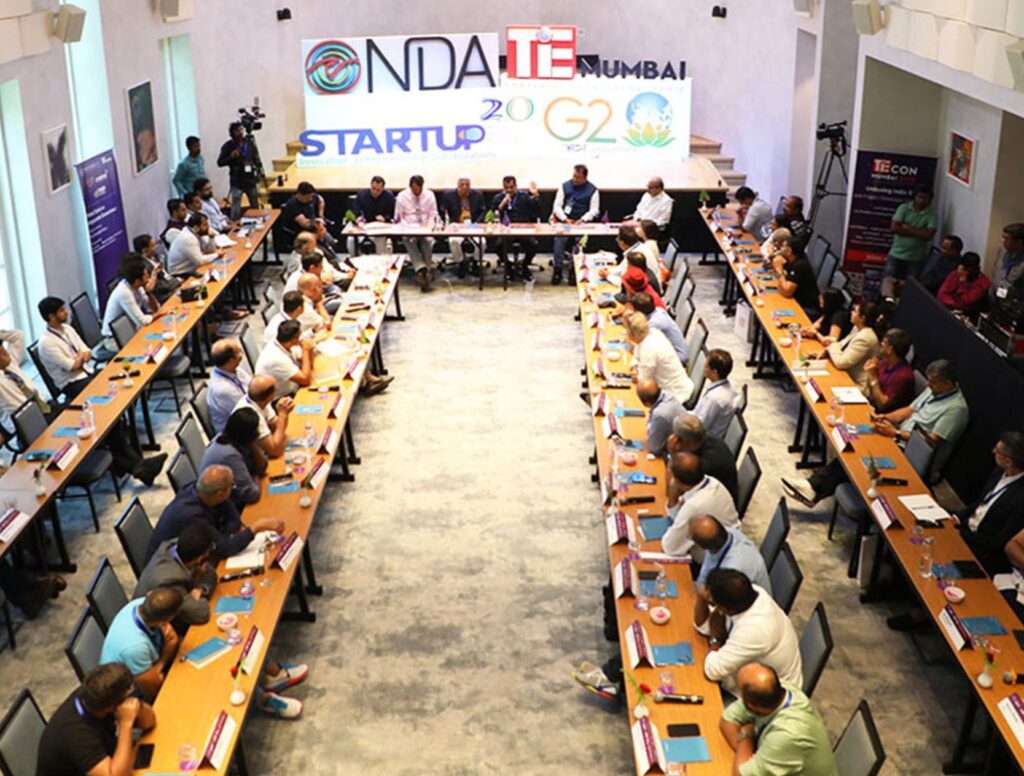
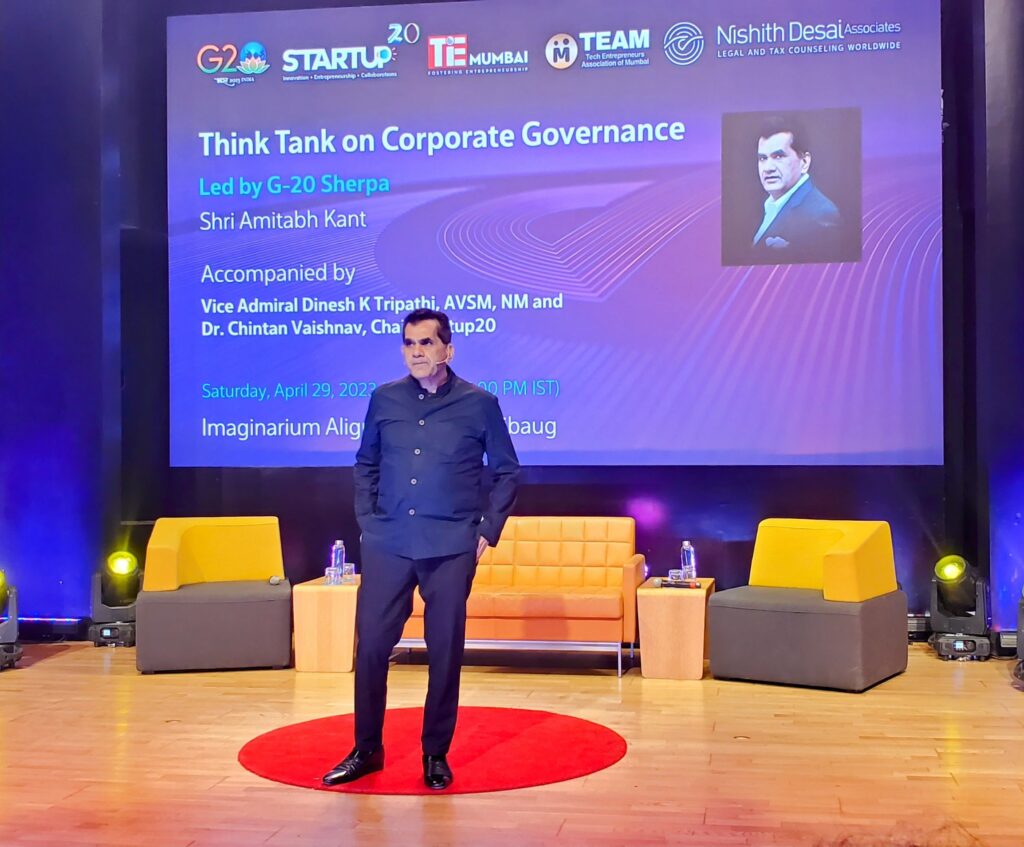
Amitabh Kant, the G-20 Sherpa for the Government of India, delivered an address at the think tank event, emphasizing the importance of establishing high standards of corporate governance for Indian companies seeking global expansion. Kant highlighted the potential for India Inc. to not only set an example for other G-20 members but also lead the way in corporate governance best practices.
Amitabh Kant, the G-20 Sherpa for the Government of India, has consistently emphasized the critical importance of corporate governance for Indian startups and companies aspiring to expand globally. His views, expressed at various forums, including the TiE Mumbai think tank event, highlight several key themes:
Key Points from Amitabh Kant’s Address and Related Insights
1. High Standards of Governance for Global Expansion:
– At the TiE Mumbai event, Kant stressed the need for Indian companies to establish high standards of corporate governance to compete on a global scale. He urged startups to set benchmarks not only for India but also for other G-20 nations.
– He believes that good governance builds trust with investors and stakeholders, which is essential for long-term growth and sustainability.
2. Self-Regulation and Financial Discipline:
– Kant has repeatedly highlighted that startups must prioritize self-regulation to avoid external regulatory intervention. He advocates for financial discipline, proper audits, and adherence to governance frameworks from inception through growth stages.
– He warned that governance failures could lead to stricter regulations, which could stifle innovation in the startup ecosystem.
3. Lessons from Governance Failures:
– Drawing on recent instances of corporate misgovernance in Indian startups (e.g., Zilingo, GoMechanic), Kant pointed out that lapses in financial management and governance have sent shockwaves through the ecosystem. He emphasized learning from these failures to avoid similar pitfalls in the future.
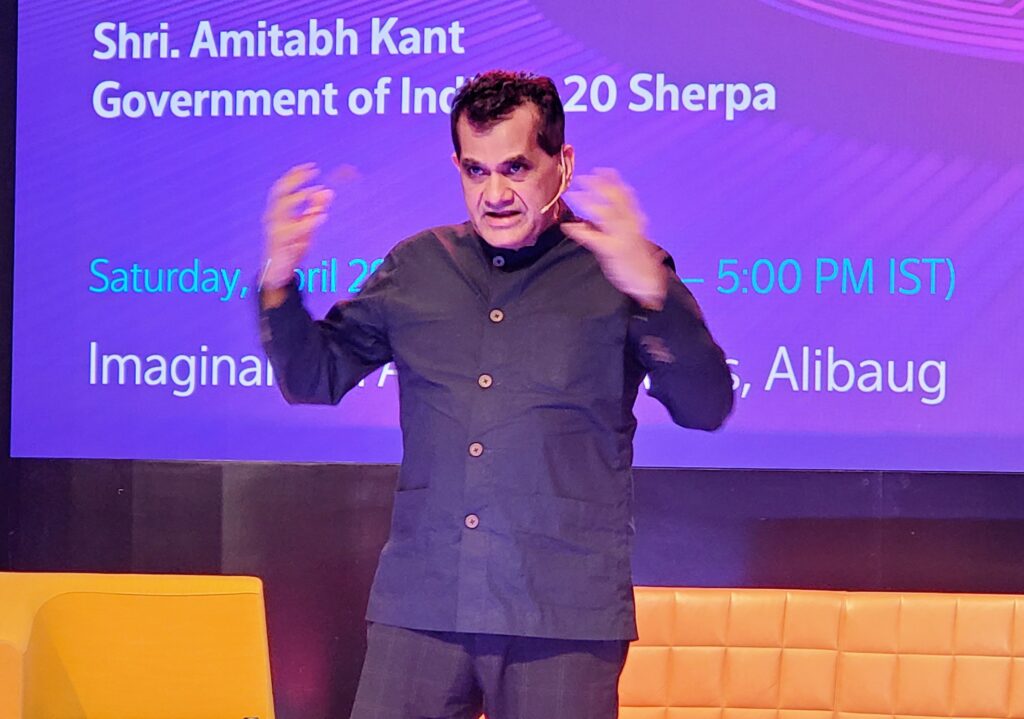
4. Startups as Drivers of Innovation and Growth:
– Kant views startups as key drivers of disruption in emerging technologies such as AI, machine learning, geospatial technologies, and electric vehicles. However, he insists that innovation must go hand-in-hand with strong governance practices to ensure sustainable growth.
5. Global Benchmarking:
– Kant has called on Indian startups to develop corporate governance strategies that align with global best practices. This includes creating a professional board structure, ensuring transparency in financial reporting, and adopting whistle-blower policies.
6. Role of Governance in Value Creation: – According to Kant, good governance is not just about compliance but also about creating long-term value. He cited examples of successful companies like Infosys that started as startups but grew into global giants by adhering to strong governance principles.
Broader Vision
Kant’s overarching vision is for Indian entrepreneurs and companies to think beyond domestic markets and aim for global leadership. He believes that achieving this requires a combination of innovation, robust governance frameworks, and a focus on long-term value creation.

Chintan Vaishnav, Chairman of Startup20 Engagement Group under G20, shared his insight and experiences on fostering a culture of creativity and discipline within corporate governance. Vaishnav discussed the role of startups in driving innovation and the need for robust governance structures to support their growth. Meanwhile, Tripathi provided valuable perspectives on the importance of discipline and accountability in maintaining strong corporate governance.
Chintan Vaishnav, Chairman of Startup20 Engagement Group under G20, and Vice Admiral Dinesh Tripathi (AVSM, NM) shared his insights and experiences on fostering a culture of creativity and discipline within corporate governance. Vaishnav discussed the role of startups in driving innovation and the need for robust governance structures to support their growth. Meanwhile, Tripathi provided valuable perspectives on the importance of discipline and accountability in maintaining strong corporate governance.
Dr. Chintan Vaishnav, Chairman of the Startup20 Engagement Group under G20 and Mission Director for Atal Innovation Mission (AIM), has consistently emphasized the importance of fostering a culture of creativity and discipline within corporate governance, particularly in the context of startups. His views, shared during the TiE Mumbai think tank event and other platforms, highlight several critical aspects:Key Insights from Dr. Chintan Vaishnav
1. Startups as Drivers of Innovation:
– Dr. Vaishnav views startups as pivotal drivers of innovation and economic growth. He believes that startups have the potential to address macroeconomic challenges and contribute to global recovery and reorientation through innovation-fueled growth.
– He emphasizes the need for robust governance structures to support startups as they scale, ensuring their sustainability and ability to compete globally.

2. Creativity in Governance:
– According to Dr. Vaishnav, creativity is essential not only in innovation but also in governance practices. He advocates for governance frameworks that are flexible yet disciplined enough to foster innovation while maintaining accountability.
– He has pointed out that governance should be seen as a tool to build trust with stakeholders, enabling startups to attract investments and grow sustainably.
3. Global Collaboration Through Startup20:
– As Chairperson of Startup20 under India’s G20 Presidency, Dr. Vaishnav has worked to create a global narrative for supporting startups. Startup20 aims to enable synergies between startups, investors, corporations, innovation agencies, and other stakeholders.
– He has highlighted the importance of creating pathways for ambitious startups to access global markets and investors while addressing challenges such as risk appetite mismatches in different economies.
4. Tailored Governance Models:
– Dr. Vaishnav advocates for governance models that are tailored to specific regional and cultural contexts rather than adopting generic frameworks. For example, he has noted that governance approaches successful in cities like Bengaluru may not necessarily work in rural or less developed regions.
5. Building an Innovation Ecosystem:
– Through his leadership at AIM, Dr. Vaishnav has overseen the establishment of initiatives such as Atal Tinkering Labs (ATLs) and Atal Incubation Centers (AICs) to promote grassroots innovation and entrepreneurship across India.
– He believes that fostering a culture of innovation requires reducing barriers such as language and institutional capacity while providing platforms for young entrepreneurs to experiment and grow.
Broader Vision
Dr. Vaishnav’s overarching vision is to position Indian startups as global leaders in innovation by combining creativity with strong governance practices. He sees governance not just as compliance but as a strategic enabler for long-term success.
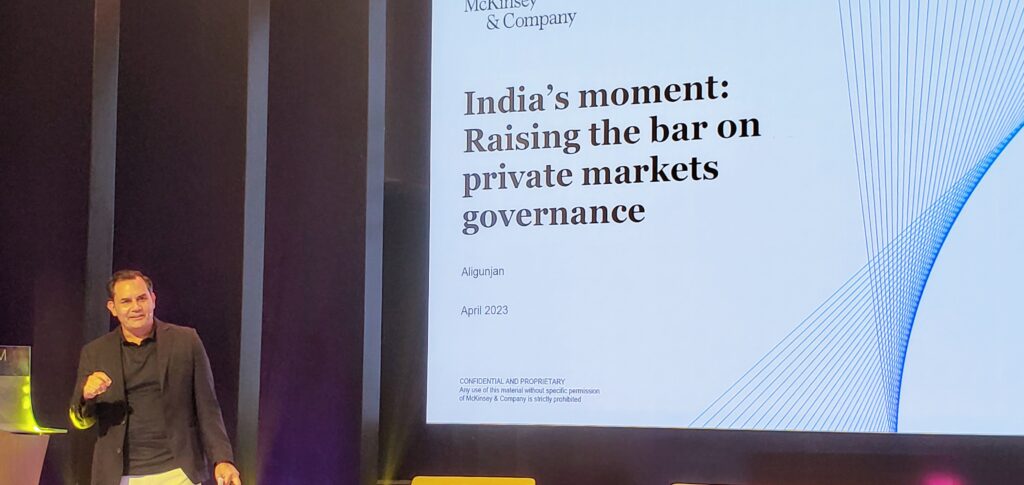
Vivek Pandit emphasizes the growing importance of robust governance in private markets, driven by increased scrutiny, complexity, and the need for long-term value creation. He stresses that governance isn’t just compliance but a culture of integrity, transparency, and strategic decision-making. Key elements include independent oversight, clearly defined roles, robust risk management, and transparent reporting. Private market participants must continually raise the bar by adopting best practices, investing in expertise, leveraging technology, and engaging with stakeholders. This proactive approach ensures trust, better decision-making, reduced risk, and long-term sustainability.
Private markets have surged to $9.8 trillion in assets, yet governance frameworks lag behind, risking valuation dislocations and reputational damage. Vivek Pandit, Senior Partner at McKinsey & Co, highlights the paradox: private firms wield immense economic influence but often lack rigorous governance akin to public companies. Over 77% of Indian unicorns pre-IPO lack independent directors, contributing to post-listing valuation drops averaging 42%. Pandit advocates institutionalizing *strategic independence*—boards that challenge growth assumptions and align incentives via long-term equity grants rather than perfunctory compliance. Culturally, governance thrives on psychological safety in boardrooms and ethical leadership, as exemplified by failures at firms like Byju’s. Regulatory reforms like India’s Companies Act 2013 codify director duties but risk creating checkbox mentalities, while investors now enforce standards via ESG-linked carry and forensic due diligence.
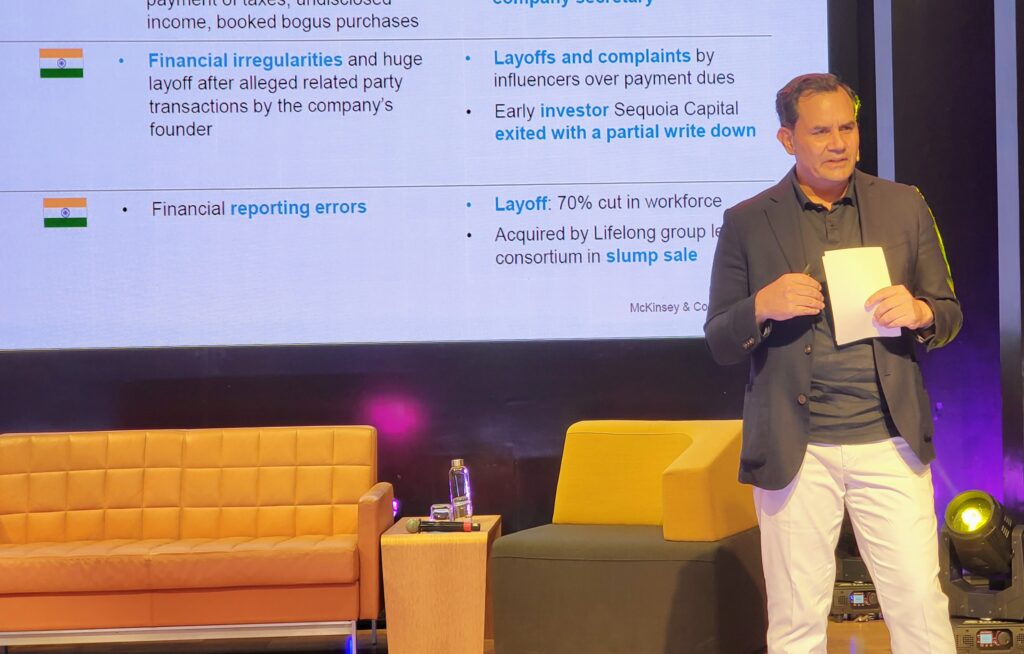
Sector-specific challenges abound: tech startups’ “fail fast” culture clashes with governance needs, demanding pre-IPO controls and founder vesting tied to milestones. ESG-focused funds face greenwashing risks, necessitating standardized metrics and independent verification.
Pandit’s roadmap prioritizes *persistence* through LP governance academies, AI-driven boardroom analytics, and global standards via bodies like IOSCO. Policy innovations, including whistleblower protections for private firms, must balance accountability with innovation. Ultimately, governance is not a tax on growth but the bedrock of sustainable value—critical as geopolitical shifts and stakeholder capitalism redefine capitalism’s social contract. Firms embracing this ethos will lead; those dismissing it risk systemic trust erosion. Pandit’s insights underscore that elevating governance is both a strategic imperative and a cultural transformation.
Pandit’s call to action focuses on building a culture of integrity as the foundation of good governance. He advocates for independent oversight to provide objective perspectives and challenge decisions, ensuring all stakeholders’ interests are considered. Robust risk management frameworks are crucial for navigating the complex landscape of private market investments. Transparent reporting fosters trust with investors and enhances accountability. By embracing these principles and continually improving governance practices, private market firms can strengthen their position, attract capital, and ensure long-term success in an evolving financial landscape.
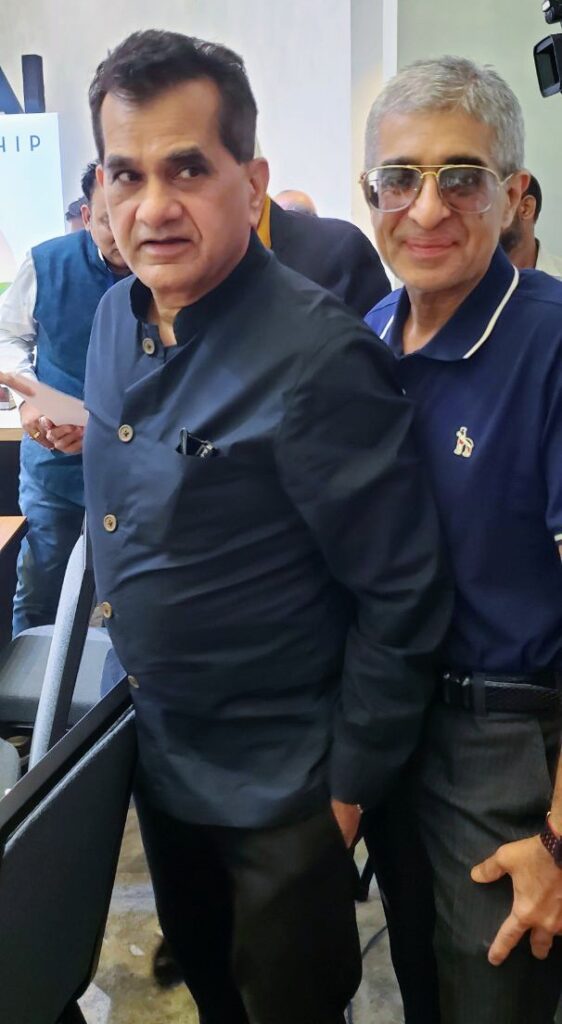
Girish Bajaj – Ceo & Strategist at GB Hypertech on a dedicated platform for exchanging unlisted securities held by family businesses addresses a critical need for liquidity and efficient management of these often substantial assets. It would connect buyers and sellers, facilitating price discovery through data and valuation tools, and streamline the complex transfer process while ensuring regulatory compliance. Crucially, it would prioritize confidentiality and data security, vital for family-owned businesses. Integration with governance features like voting rights tracking and succession planning tools would further enhance its value.
The platform would offer transparency through access to company information, due diligence resources, and market insights, empowering informed decision-making. Secure transactions and KYC/AML compliance would build trust and mitigate risks. While challenges like ensuring sufficient liquidity and accurate valuation exist, the potential benefits are significant. Increased liquidity, fairer pricing, simplified transactions, and improved governance would enable family businesses to unlock the value of their unlisted holdings and facilitate smooth intergenerational transfers.
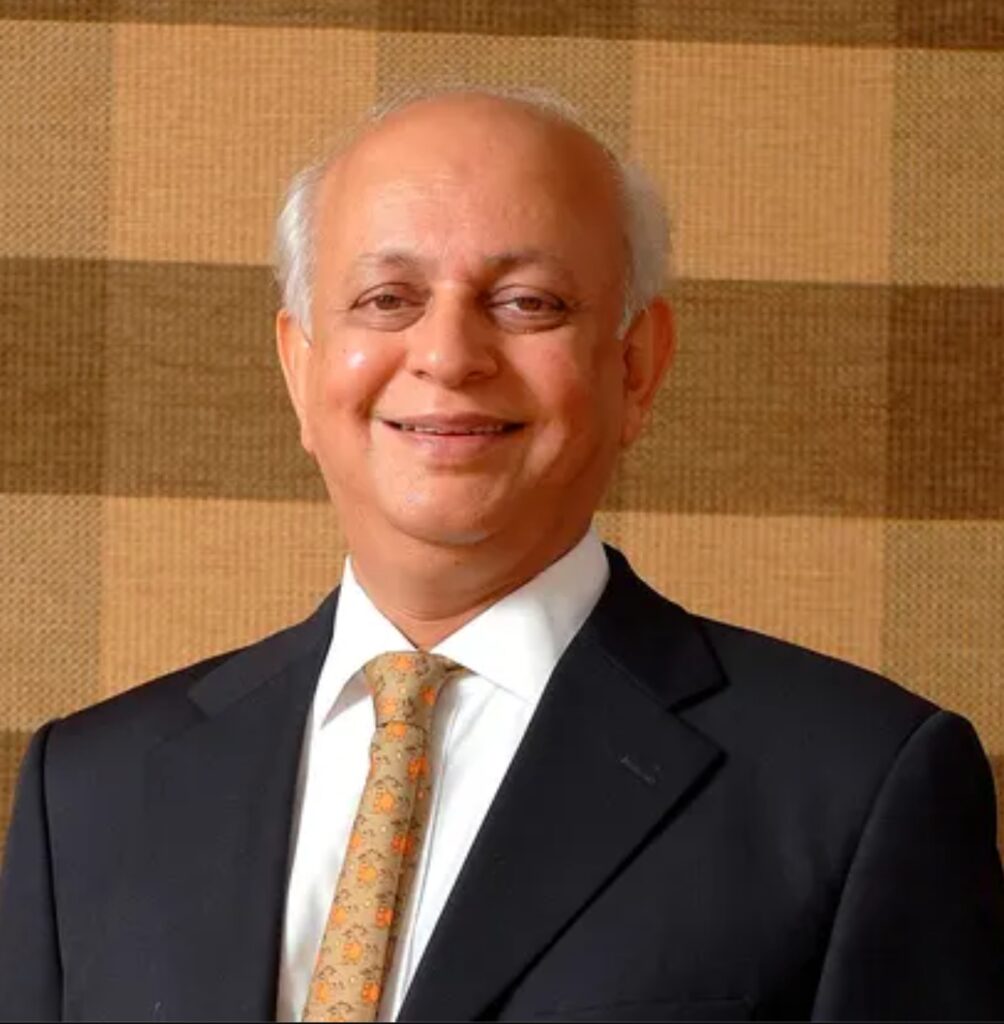
Hemendra Kothari proposed the establishment of a platform exchange for unlisted securities, with the objective of transitioning the opaque over-the-counter (OTC) market into a transparent and regulated environment. The proposed platform would offer several key advantages, such as:
Improved price discovery:
By providing a centralized platform for trading unlisted securities, investors would benefit from increased transparency, leading to better price discovery.
Enhanced liquidity:
The platform would increase liquidity for unlisted assets, making it easier for investors to enter and exit positions.
Broadened investor participation:
A formalized exchange would attract a more diverse range of investors, including institutional investors, leading to increased capital inflows into the private market.
Unlocking value and facilitating capital raising:
The platform would enable private companies to access a larger pool of investors and raise capital more efficiently, while also providing liquidity for existing shareholders.
Boosting market confidence:
Standardized processes and regulatory oversight would instill confidence in market participants, contributing to the overall growth of the private market segment.
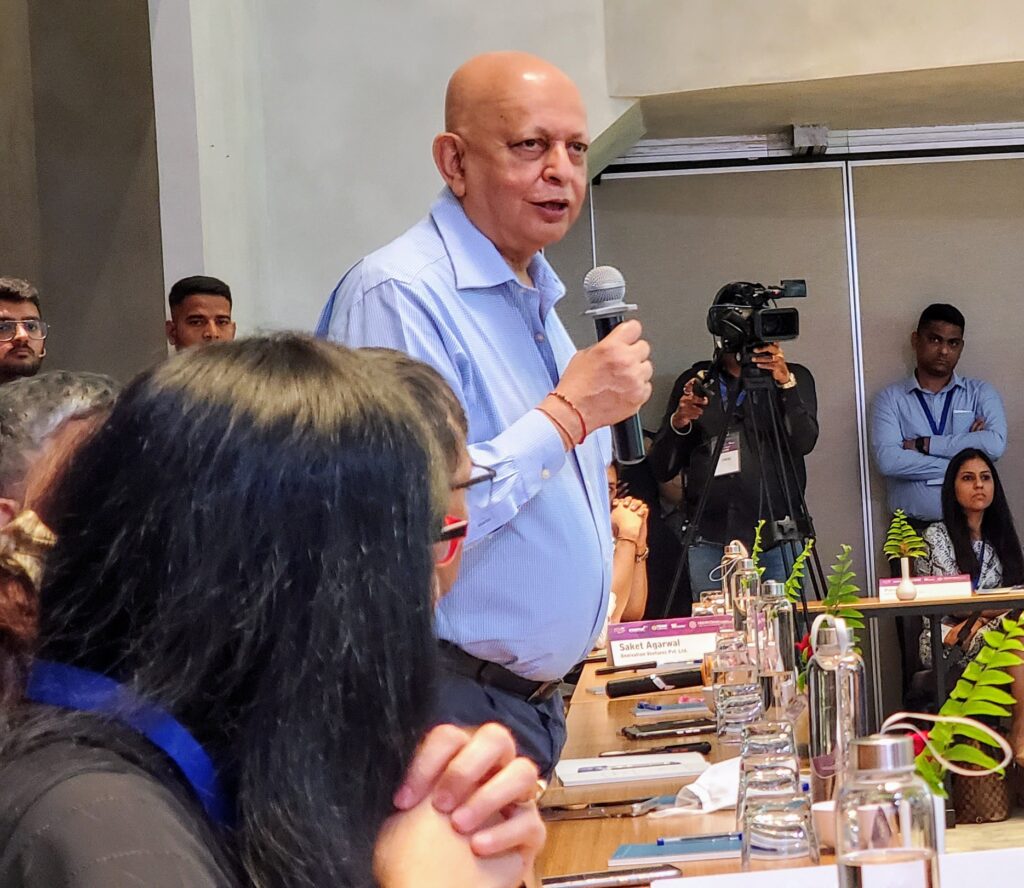
The proposed initiative aligns with the exchange’s strategic goals of expanding its market reach and diversifying its product offerings. To further evaluate the viability and potential impact of this opportunity, Kothari suggested conducting a feasibility study. This would enable the exchange to make an informed decision on the implementation of the platform and its potential benefits for the private securities market.
